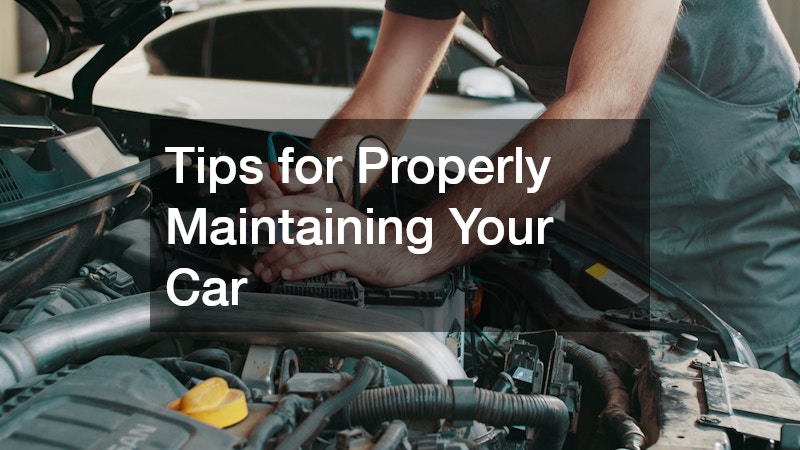Maintaining your car properly is essential for ensuring its longevity and safety. This article provides practical tips and guidelines for car maintenance, addressing the most common concerns and questions drivers and auto repair shops have.
How Often Should I Change My Oil?
Understanding Oil Change Intervals
Oil change intervals vary depending on the make, model, and year of your vehicle, as well as your driving habits. Generally, it’s recommended to change your oil every 3,000 to 5,000 miles, but newer cars may safely extend that interval up to 10,000 miles.
Driving in severe conditions, such as excessive idling or towing heavy loads, may necessitate more frequent changes. Always consult your vehicle’s manual to determine the optimal schedule for your car’s oil changes.
It’s crucial to monitor your vehicle’s oil level regularly, as low oil can lead to engine damage. Keeping up with your oil changes ensures the engine stays lubricated and operates efficiently.
Choosing the Right Type of Oil
Selecting the right type of oil for your vehicle is vital for maximizing performance. Synthetic oils, though usually more expensive, offer superior lubrication and help engines run cooler.
Conversely, conventional oils are more affordable and may suffice for older cars or those with lower mileage. Be sure to follow the manufacturer’s specifications when choosing between synthetic and conventional oils.
Additionally, consider factors such as the environment and your driving conditions when selecting your oil. Proper oil choice can contribute significantly to the smooth operation of your vehicle.
What Are the Signs My Brakes Need Attention?
Recognizing Common Brake Problems
Being alert to the symptoms of brake problems can help ensure your safety on the road. Unusual noises, such as squeaking or grinding, can indicate worn out brake pads that need immediate replacement.
If you notice vibrations when you apply the brakes, it could signal warped rotors. Similarly, changes in brake responsiveness may suggest issues within the brake system that need professional assessment.
Ignoring these signs could compromise your vehicle’s braking performance, leading to more extensive and expensive repairs. Addressing brake problems early helps avoid potential accidents.
Maintaining Brake System Health
Regular brake inspections and maintenance can prevent major brake system failures. A professional check every 6 months can help detect wear-and-tear before it evolves into a critical issue.
Keeping brake fluids topped off is vital, as low fluid can affect the car’s stopping power. Additionally, replacing brake pads and rotors as needed maintains optimal braking efficiency.
Keep an eye on the brake warning light on your dashboard; this could indicate an electronic issue or a hydraulic system problem. Proactive maintenance keeps you safe and extends the life of your brake components.
How Can I Improve My Car’s Fuel Efficiency?
Driving Habits That Save Fuel
Your driving habits significantly affect your car’s fuel efficiency. Maintaining a steady speed and avoiding rapid acceleration helps conserve fuel.
Reducing idling time is also beneficial, as idling consumes more fuel than restarting the engine. Anticipating traffic changes and coasting to stoplights rather than braking sharply can further improve fuel economy.
With these efficient driving practices, you can not only save money at the pump but also reduce your car’s carbon footprint. Responsible driving behavior keeps both costs down and the environment cleaner.
Regular Maintenance and Fuel Efficiency
Proper vehicle maintenance is crucial for optimizing fuel efficiency. Ensuring your tires are properly inflated improves gas mileage, as under-inflated tires cause drag that requires more energy.
Regularly changing dirty air filters can enhance your engine’s efficiency, leading to significant savings in fuel over time. Timely tune-ups, which include regular engine checks, further ensure your engine is running at peak performance.
In combination with good driving practices, regular maintenance helps achieve the best fuel economy possible. This holistic approach to vehicle care benefits both your wallet and your vehicle’s lifespan.
What Should I Include in Regular Tire Maintenance?
Checking Tire Pressure and Tread Depth
Maintaining proper tire pressure is critical for safety and performance. Incorrect tire pressure can lead to uneven tread wear, reduced fuel efficiency, and even blowouts.
It is advisable to check your tire pressure monthly, as tire pressure can change with temperature fluctuations. Additionally, regularly inspecting tread depth can prevent slip accidents and decrease stopping distances.
Proper tire maintenance not only extends the life of your tires but also ensures safer, more efficient driving. This practice helps avoid costly repairs and replacements.
Rotating and Balancing Tires
Regular tire rotation is essential for achieving even tread wear. Rotating tires every 5,000 to 7,000 miles can prolong tire life significantly.
Balancing tires helps in reducing vibrations and ensuring a smoother ride, preventing uneven wear. It’s often performed together with rotation to maintain optimal tire performance.
These practices contribute to handling consistency and ride comfort, enhancing your overall driving experience. Consistent scheduling of these services helps maintain vehicle stability.
Regular car maintenance is crucial for performance and safety. By following these tips and keeping a routine schedule, you can ensure your vehicle remains in optimal condition, preventing costly repairs and improving your driving experience.



